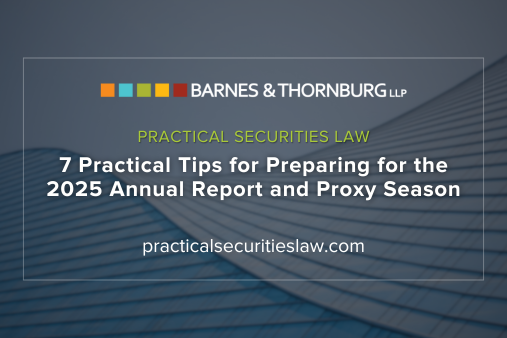On the heels of the midterm elections, Barnes & Thornburg’s Environmental Department hosted a three-part seminar at our Washington, D.C., office, highlighting the administration’s achievements and future goals in the environmental enforcement space.
Susan Parker Bodine, the assistant administrator for the EPA’s Office of Enforcement and Compliance Assurance (OECA), reviewed many of OECA’s developments and accomplishments since her Senate confirmation about one year ago. In particular, she shared her office’s efforts to reduce significant lag times between EPA inspections and the release of inspection reports, a process that previously has delayed action on possible environmental violations for a year or more. Now, the goal is to have 75 percent of all inspection reports completed within 60 days and then communicated to the permittee within 10 days thereafter. Ms. Bodine also discussed OECA’s guidance focusing on cooperative federalism, compliance assurance (which still includes EPA Regional and state enforcement), and renewal of self-audit policies. Her remarks provided valuable insight into the Trump administration’s policies and procedures, and the role that regulated communities can play in engaging the EPA on various issues.
Next, Jonathan Pawlow, senior counsel to the U.S. House Transportation & Infrastructure Committee’s Subcommittee on Water Resources & Environment, spoke about his 16 years of Capitol Hill experience and lessons learned in prior leadership changes from Republicans to Democrats (and vice versa). He identified areas of recent bipartisan success and probable focal points for a new Democratically-controlled Transportation & Infrastructure Committee. Mr. Pawlow provided valuable insight for regulated parties on how to engage new members of Congress or even established congressional representatives with new roles or responsibilities.
Finally, I moderated a panel of Barnes & Thornburg’s Environmental Department, including Charlie Denton of our Grand Rapids and Atlanta offices, Michael Elam and Louise Dyble of Chicago, and Dave Gillay of Indianapolis. The panelists shared their thoughts and experience in new developments or emerging matters, including what to expect from the upcoming Supreme Court session, how to manage and close out complex redevelopment projects, an expanded focus on challenging and emerging contaminants such as chlorinated solvent vapor intrusion or per- or poly-fluorinated alkyl substances (PFAS), and finally cutting edge state issues such as the evolution of the public trust doctrine in California.
We will be following all of these issues and more as they continue to unfold in the coming months and years. Stay tuned for more insights and analysis from the Barnes & Thornburg national Environmental Law team.










/Passle/6488d4630e7e25c9ac9f834a/SearchServiceImages/2025-01-10-22-16-01-995-67819c21f01b92931abcaac4.jpg)

